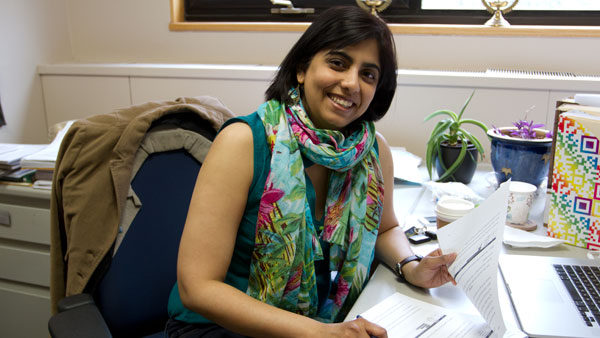One of 800 recipients from 125 countries, Bhavani Arabandi, assistant professor of sociology at Ithaca College, has been awarded a Fulbright Nehru Academic and Professional Award for Teaching and Research. Arabandi will travel to Hyderabad, India in July to continue her research on globalization and outsourcing.
The Fulbright U.S. Scholar Program is an international educational exchange program funded by the U.S. Department of State that gives teaching and research grants to scholars from around the world for projects lasting two to 12 months. Arabandi, who earned her doctorate in sociology from the University of Virginia, will be teaching a class in feminist theory at the Hyderabad campus of Tata Institute of Social Sciences and will investigate the drop in women’s participation in the labor force in Hyderabad.
Contributing writer Arham Muneer sat down with professor Arabandi to talk about her research in the field of sociology, the process of becoming a Fulbright scholar and her expectations for the research and teaching she will do in India.
Arham Muneer: Tell me about the research you have done in the past.
Bhavani Arabandi: The broad context of my research is globalization of services. In the U.S., there is a widespread view of people losing their jobs to outsourcing, and while that is true, I look at the other perspectives – the other end. In my research in Hyderabad, India, I examined two companies: a domestic bank that was globalizing and a global IT company that was localizing, and I studied the work conditions of the employees. I try to find out more about workers’ rights, the opportunities and constraints they have and women’s changing identities at work and home.
AM: How did you become interested in the field of sociology?
BA: I have always been interested in social change and social justice issues. I have a Master’s degree in social work, and I worked with grassroots level organizations in India on women’s rights and empowerment, and that in a way thrusted me into graduate school for sociology. Sociology in the U.S. is a broad discipline and it works well with my interests in international development, feminist research and methodologies, and globalization.
AM: What was the process of becoming a Fulbright scholar like?
BA: That process started a long, long time ago — almost a year and a half ago. The college where I got my degree in social work, Tata Institute of Social Sciences in Mumbai, India, opened up a campus in Hyderabad, and one of my mentors, Dr. Lakshmi Lingam, became its deputy director. I wanted to work with her, and I also wanted to give back to the community that has given me so much. In the future, to become involved in connecting students at TISS with Ithaca College students. These reasons played a major part in why I wanted to go ahead with this project. So I talked to my mentor and told her about my ideas, and she was really enthusiastic about it, and then I put in an application.
AM: What will you be working on in India?
BA: I am going to be teaching a graduate class in the women’s studies program [at TISS] called Theorizing Feminisms, and I have also added a research component to it. Hopefully, when I come back next year, I will be able to establish a connection between the students. The International Labor Organization has identified that even though an increasing number of women in India have access to higher education, these women seem to disappear from the job market. The question is, why? This is a very important question since the Human Development Index says that a country’s well-being and development rate is dependent on how many women are in the labor force. I will follow students at the college level and see what happens once they finish college — what are the restrictions and opportunities for them.
AM: What do you hope you will be able to accomplish as a result of your research?
BA: I think connecting young people from around the world is very important in solving global social issues, such as gender inequalities, because these issues have common threads across different parts of the world. If young people work together, I think they can come up with creative solutions to resolve these issues. By connecting students in two different colleges and countries, I hope to create a global classroom where students can learn from one another and work together.








